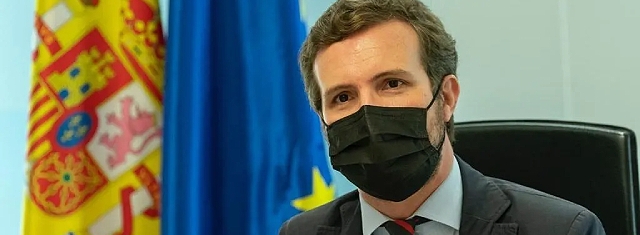Politics
The leader of the conservative opposition Pablo Casado resists but is left alone
Some of his defenders abandon him

Pablo Casado
USPA NEWS -
The conservative Popular Party, the first opposition party to the Government of the socialist Pedro Sánchez, will hold a meeting of its National Council of Directors next Monday, the main body between congresses and which could convene an extraordinary congress in which the secretary general of the conservatives, Pablo Casado, could lose office. After the scandal broke out over the alleged investigation of the president of the Madrid regional government, Isabel Díaz Ayuso, the Popular Party split in two between the supporters of Ayuso and the supporters of Pablo Casado.
Last Friday, the Popular Party announced the opening of a file to the president of the Madrid regional government, Isabel Díaz Ayuso, to clarify whether her brother illegally benefited from the contract signed by the Madrid regional government to buy masks during the first wave of the pandemic. There was talk then of a commission of 280,000 euros (316,733.20 USD), although the Madrid president, Isabel Díaz Ayuso, who met on Saturday with Pablo Casado, lowered that figure to 53,800 euros (60,858.02 USD). The Madrid leader offered the Secretary General of the Conservatives all the explanations they required. After that meeting, the Popular Party announced the closure of the open file against Isabel Díaz Ayuso, in what was interpreted as a step back from the conservative leader.
The disagreement between Isabel Díaz Ayuso and the general secretary of the Popular Party, Pablo Casado, began months ago, when the regional leader announced her intention to run for the Presidency of the Popular Party of Madrid. Traditionally, the Popular Party of Madrid has functioned as a counterweight to the party's national leadership. Last summer, the number 2 of the Popular Party, Teodoro García Egea, blackmailed Isabel Díaz Ayuso: either she resigned from chairing the Popular Party of Madrid or the party's national leadership would make public information that harmed the image and political future of the leader in Madrid.
In the midst of this conflict, the Popular Party has sunk in the polls. It is now five points behind the Socialist Party and threatened by the far-right formation Vox, which could overtake it if the legislative elections were held today. 25% of the militants would abandon the party if the crisis is not satisfactorily closed. The division in the party affects all levels: the militants, more and more, ask for the resignation of Pablo Casado. They consider it unacceptable that, with dark intentions and false arguments, a leader be investigated.
But more important than militancy are the so-called "barons" of the party, presidents of regional governments. The main one is the president of the regional government of Galicia, Alberto Núñez Feijoo, the first who criticized the unfortunate show that the Popular Party was giving and asked Pablo Casado to make responsible decisions. A euphemism meaning: go away!
Núñez Feijoo was joined on Monday by the presidents of the regional governments of Madrid, Andalusia and the candidate elected in Castilla y León. Also other regional leaders without government responsibilities. And many prominent conservative leaders. Pablo Casado had called this Monday a meeting of the Steering Committee of the Popular Party. He intended to measure the internal support he has in the party, in case it was possible to hold out until July, when the party will hold its ordinary National Congress and, until then, recover the support lost by this crisis.
But at Monday's meeting, the conservative leader learned that the "barons" of the party, many leaders and several of his defenders have withdrawn their support. In this context, the convening of a Council of Directors for Monday allows Casado to gain time, although the call for an Extraordinary Congress that certifies the political end of Casado comes from that Council.
Liability for this article lies with the author, who also holds the copyright. Editorial content from USPA may be quoted on other websites as long as the quote comprises no more than 5% of the entire text, is marked as such and the source is named (via hyperlink).





